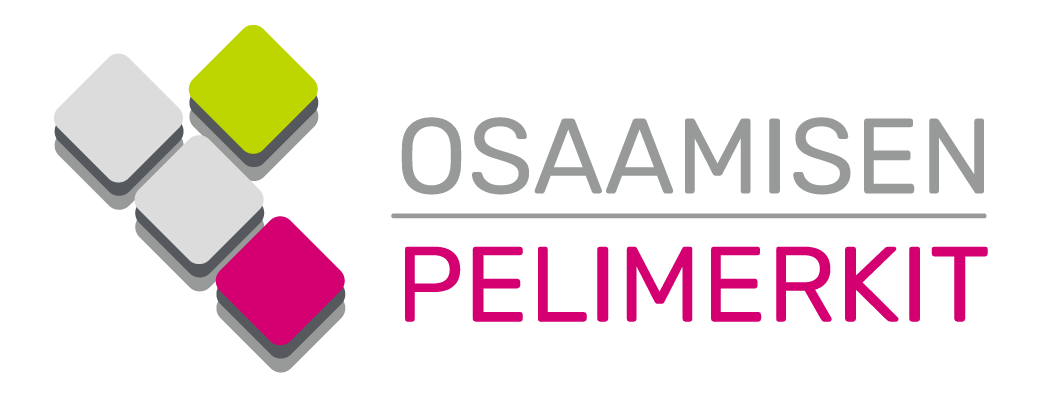Lue artikkeli suomeksi
The Finnish game industry is getting attention in the world with its openness and sense of community. In addition to that the Finnish game industry itself has attracted professionals to companies from abroad The International Game Developers Association (IGDA) has a unique chapter in Finland which people from other countries come to learn from.

Photo: IGDA Finland
Over a half of Finnish game professionals are members of IGDA. IGDA Finland has around 1700 members in 12 hubs where teams of dedicated volunteers manage popular events. A regular attendance at Helsinki Hub exceeds 500 participants.
“IGDA Finland has earned the reputation of being one of the organization´s flagship chapters”, said Rovio producer Christopher Hamilton, who was elected to the Board of IGDA in March.
What is IGDA?
“IGDA is a community of past, current and future game developers. We are not a trade union and we don´t look at things from a business point of view. The main interest we defend is the possibility for game developers to learn and grow”, said lead coordinator Jonne Harja of IGDA Finland’s Helsinki Hub.
“Our most important goal is encouraging people to talk to one other and share information”, added Hamilton. “We want to help individual game developers to develop their careers.”
At the moment IGDA has 150 chapters in 73 countries. IGDA Finland is one of the few chapter that run events in multiple locations. It works as a network of 12 Hubs from Rovaniemi to Helsinki and from Vaasa to Kotka.
All the activities are organized by volunteers. Not even the coordinators get paid for their work. The organization does not make a profit or handle money in addition to membership fees. The sponsor money goes directly to the event venues.
“IGDA volunteers organize events in the hubs across Finland. Members of the IGDA Finland board help hubs, by identifying and addressing the specific needs of each city and making sure that best practices are shared and followed”, Hamilton said.
Also employers find IGDA valuable.
“Many of the members get their membership directly from the company where they work. Firms pay membership to all their employees, that’s like a routine. They want to invest in them, because they think it is useful”, Harja explained.
“It’s a way for companies to give back to the community,” Hamilton added.
“We are doing so well that people from other countries have contacted us and wanted to come to learn from us. We have also had them flown here”, Harja said.
Open discussion between friends
Finns stand out from many other countries in that the discussion is very open and free. People are not afraid to share their knowledge and experience with each other: it is natural to help others with the problems they are facing at work.
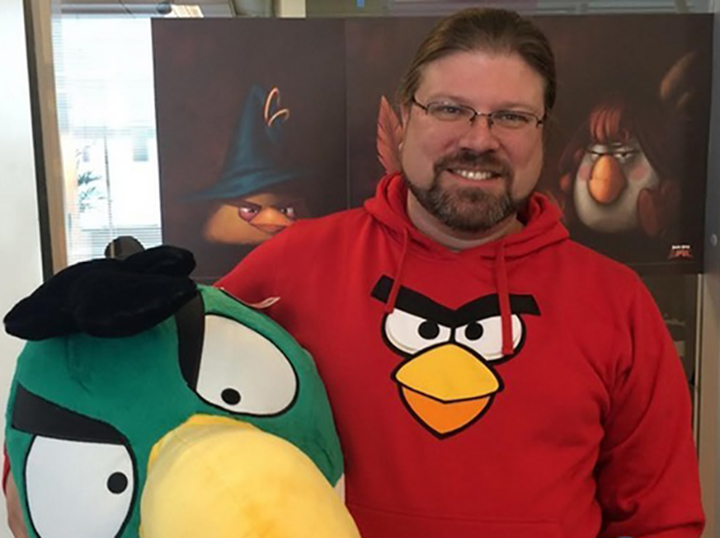
Rovio producer Christopher Hamilton wants to give back to the game dev community. Photo: Juhana Wirtanen
“One friend asked me how things were going at work,” Hamilton started. “I complained how a Unity upgrade caused the game I was working on to bloat to 115MB. Rovio at the time had a policy of only releasing games below 100MB so they it could be downloaded over 3G. The team was struggling to figure out what to cut and was frustrated it was blocking new development. My friend mentioned a bug that he had struggled with earlier and an easy solution to remove some of the bloat. We investigated the next day quickly removed about 12MB, and we solved the problem a few days.”
“That conversation over a few a drinks probably saved at least a week of development time”, Hamilton concluded.
Meetings usually begin with some form of a seminar or company presentations and after that people are networking freely. The most important thing is the feeling of belonging to a group who sincerely wants to help each other.
IGDA Finland was born in 2003 around the same bunch of friends, who founded the first commercial game companies in Finland, like Remedy. They wanted to get together and put an extra effort to organize meetings once a month.
“They are more or less CEOs and such and some of them have been around the world for several times. It was a small group of guys who knew each other since childhood and trusted one another, so it was very natural for them to keep in touch and do things together in spite of everything”, Harja said.
Since there were a crowd that wanted to belong to that group of friends, the concept of meetings was picked up from IGDA which has been working for 24 years.
Hermits come out
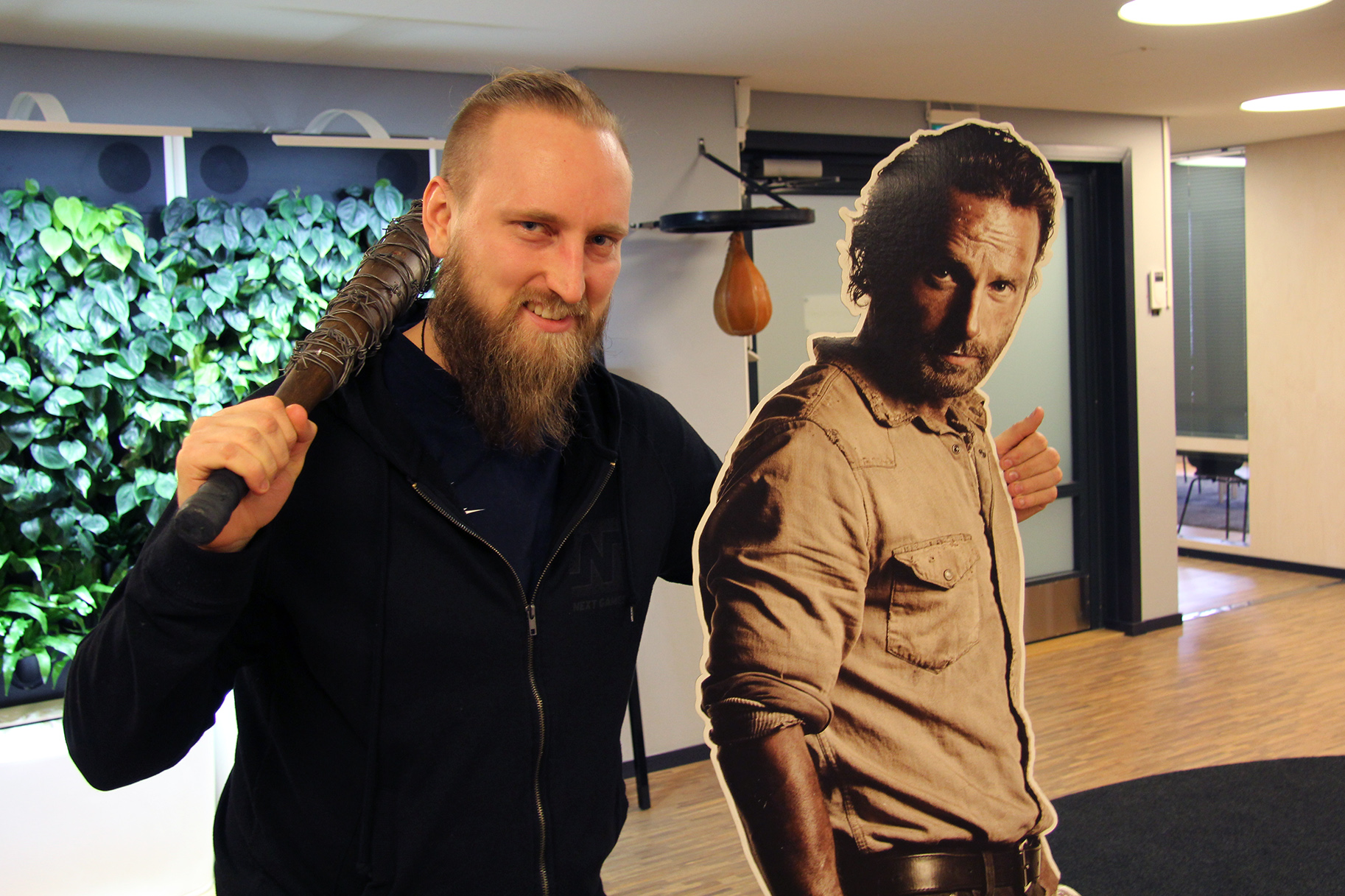
For Jonne Harja the development of the game industry network is a matter of heart. Photo: Minna Kilpeläinen
For Harja, the opportunity for individual game developers to learn from each other is a matter of heart. Already as a student, eight years ago, he founded game co-operative EXPA which is now known as IGDA’s Jyväskylä Hub. At the time, the game industry was scattered and training in the field was just starting. Harja was a student of Informations Systems Science and Business and he was sitting in one of the few game courses in the University of Jyväskylä when he got inspired by a visiting teacher’s question.
“Coincidentally Suvi Latva, one of the supermasters of the Finnish game industry, came to teach in the Glamour of Games -course in Jyväskylä. She said that unfortunately she didn´t know anything about Jyväskylä´s game industry. She couldn´t get the information anywhere, because there was no such place or organisation she could ask that from. So If she wanted to know about Jyväskylä’s game industry, she would have had to ask that in facebook. And she told us, that everyone has some kind of a community or organisation where to find information.
So then after the lecture I went to talk to her and I said I’d like to set up that organisation”, Harja said.
However, it didn´t just happen by his snapping fingers in Jyväskylä.
“It was quite a rocky road. We were very busy lobbying the politicians, but the city was in no way interested in the game industry back then”, Harja said.
“In the beginning we thought we were starting this job out of nowhere, but soon we realized that there already were some game companies in Jyväskylä. They were just so hidden and silent about themselves. They were like hermits and were just doing their own thing. At the time the gaming business was different: it was possible to publish a mobile game and make enough money to be able to live with it for a couple of years.”
Harja founded the game co-operative Expa, which helped local game developers in the publishing their games and in game development in general. Expa also played a key role in giving the game developers a possibility to network and developing better basis for new businesses. Like IGDA, Expa had a goal of creating a lively and organic game developer community.
Jyväskylä’s gaming industry as well as Expa and IGDA’s Jyväskylä Hub developed rapidly and were going strong when Harja moved to Helsinki two years ago. In addition to the junior game developer’s job in Next Games, he is currently organizing IGDA’s Helsinki Hub meetings, which regularly attracts more than 500 visitors.
The success of others doesn´t hurt
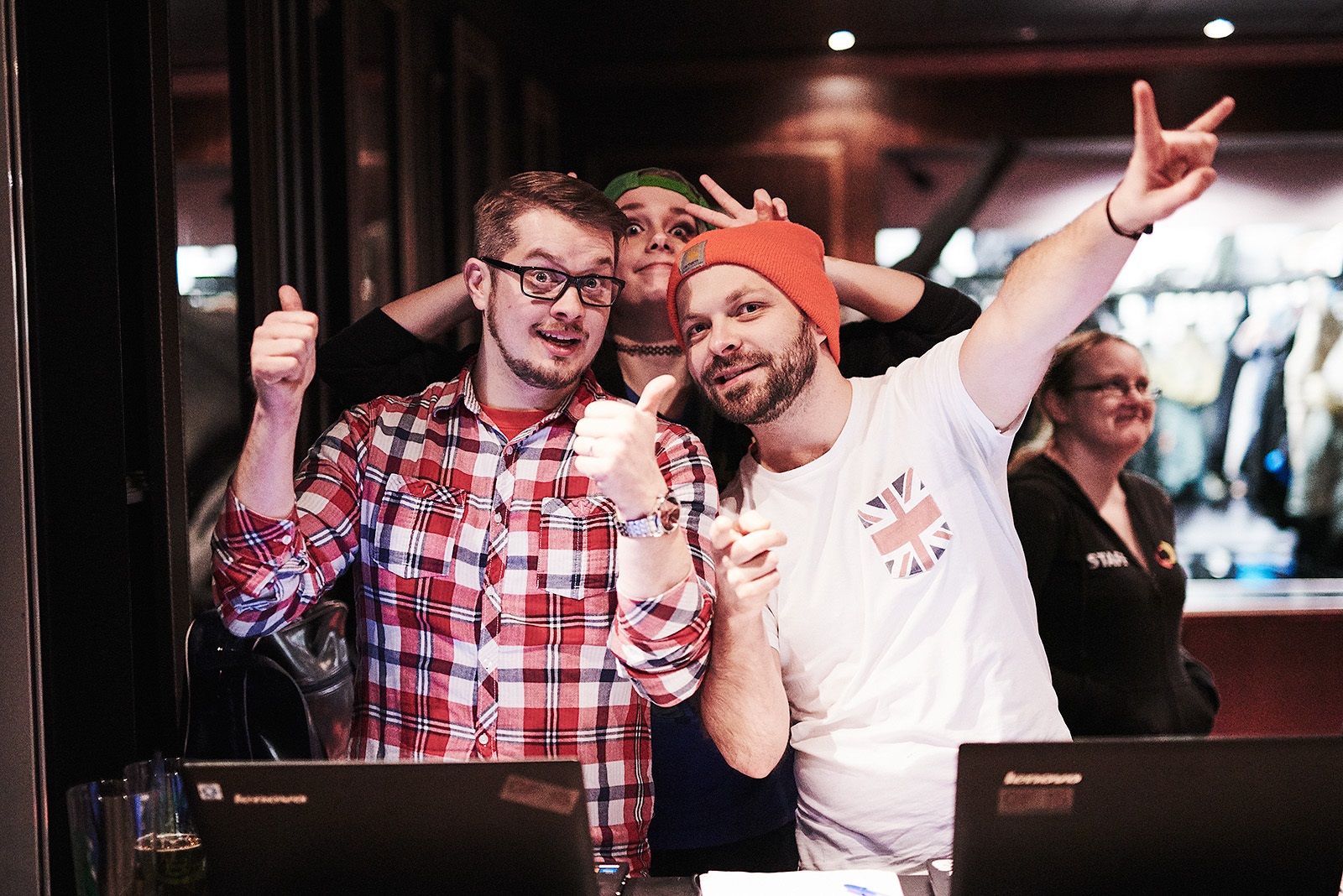
Photo: IGDA Finland
Christopher Hamilton thinks one of the reasons for IGDA’s popularity in Finland is that we have many small game companies. When there are not so many colleagues, there´s a bigger need to get in touch with others.
“In other countries like UK or US cities usually have a history with more larger, AAA companies. They have hundreds of employees which socialize among themselves and a long development cycles lasting a couple of years. They make games for companies like Sony and Microsoft where they sign the NDAs. It’s not really conducive to having quick learning or sharing. In Finland you have small development teams with short development cycles, thus people and teams learn much faster and there no NDAs involved”, Hamilton compared.
“Finland being such a small market, people knew that had to compete internationally to succeed, thus there was an attitude that it was Finland vs the rest of the world and everyone helped each other out with whatever tips and tricks they learned to grow the Finnish gaming industry together. There was a strong desire to get together, share what they have learned and talk about their work”, Hamilton explained.
“Of course there are couple of companies that have been publicly listed like
Remedy, Rovio, Next Games, even Nitro Games. These companies can no longer disclose information as freely as they used to. But in general I find the environment here very open and sharing.”, Hamilton said. “It´s very organic in Finland.”
“There´s not the same kind of transparency, if you think that the gang will switch to other companies when they see what they do there”, Harja said. “We think that we are doing so cool stuff that we dare to allow our employees to hang out with workers from other companies and they still don´t want to leave. And if they want to leave then it’s still fine.
In, but out
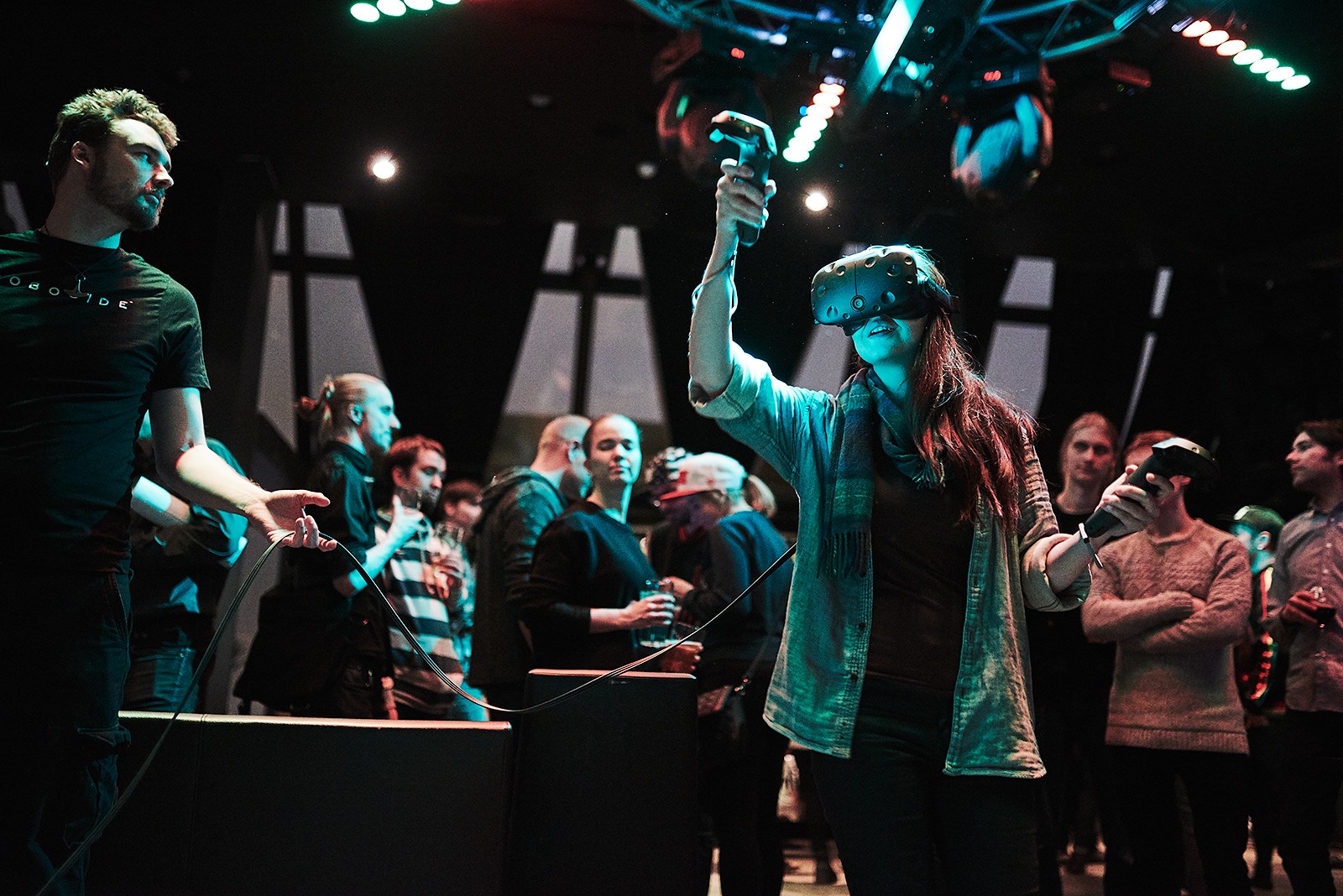
Photo: IGDA Finland
At IGDA’s meetings, however, there is a small gap that Harja and Hamilton want to fill in in the future. In a survey that IGDA Finland made in autumn 2017, also a globally well-known problem emerged between inexperienced jobseekers and senior practitioners.
“Beginners and students are often struggling to find a foothold into the industry and sometimes feel frustrated if they aren’t welcomed by more experienced members. Industry veterans often come with the goal of catching up with their old friends and hearing about the new things former colleagues are working on, rather than help someone they don’t know or expand their network”, Harja said.
As a solution to this problem IGDA Finland is looking to introduce the Mentor Cafe concept that was developed by IGDA. Here veteran volunteer mentors meet young people and answer questions they might have in their particular area of expertise.
“Bunch of experts sit around bunch of tables for junior people
and students coming in. Maybe we have themes they are interested in and they can talk about those issues and sort of have informal dialogue. Perhaps they will get to know each other and will be encouraged to chat a later event”, Hamilton said.
The problem of getting a job is not necessarily based on lack of jobs. In 2016, Neogame’s survey found that the gaming industry also has a shortage of employees. The problem is that the workforce that is available in Finland is not like what is needed right now. Senior experts need to be recruited from abroad when Finnish applicants don´t have enough experience. About one fifth of those working in the Finnish game companies have come from abroad.
Desirable skills
When game education institutes can not provide work experience, how can they convince employers that their graduates really know something about the craft?
Harja gives credit to the project courses because the students make games there. However, he wishes that also the theory of the game developing would be taught more. Students should also know how to tell others about their own work. Pitching skills can and should be practiced.
Attitude also matters.
“In the field of games, employees should have a lot of social skills and also maturity and humility in what they do. And they should also be somewhat detached from their own work so that their ego doesn´t break if someone gives feedback. On the contrary, they should be interested in the other views and be like, oh, you can think that way, too”, said Harja.
Hamilton emphasizes teamwork skills and willingness to adapt in job searching.
“It’s helpful if graduates have strong skills in programming or art. Many specific game related skills can be learned on the job. But programming and art skills can be applied to positions outside of gaming”, Hamilton said.
“But attitude is everything. It’s important that people are hungry to learn. You should teach them people skills and to be prepared to do a great deal of work so they can get multiple kind of jobs. You may develop games on your freetime and have a job somewhere else and maybe if you´re lucky you end up in a game company. You need skills to adapt and change in the market. This industry is constantly changing and evolving”, Hamilton said.
Hamilton´s own career in the gaming industry began by translating games from Russian into English. By that he also showed his ability to understand culture-specific expressions that do not translate linguistically word for word. Understanding of intercultural communication and different business models opened the door to negotiations with different game companies, and the road brought him to Rovio as a producer.
Competing for visibility
The aim of the Chips for Game Skills -project is also to strengthen the bridge between studying and working life. It is done not only by identifying the skills needed in the industry and by developing training, but also by giving students the opportunity to present their games in the Bit1 competition and networking event. The best student game in Finland gets the Bit1 Game Award in May. But what is the importance of competitions in the gaming industry?
“IGDA is actually very non-competetive community, but of course there are lots of competitions at game conferences around the world. It’s always good if you can say that our game has won this prize. That’s really essential because findability is a big problem in the gaming industry. In addition, competitions create external pressures that don´t occur in the normal everyday life. They will help to become a professional game developer”, said Harja.
Marketing is essential for every new game.
“If we just make a game here at Next Games and not put so much effort into marketing, then no one will hear about the game. It’s pretty much the same for all companies globally. Even the ancient giants like the Electronic Arts and others, can publish games that no one has ever heard. Every day there are a thousand new mobile games published, so it’s not enough to make a good game if nobody ever hears about it”, Harja said.
Writer: Minna Kilpeläinen, MPhil, MEd, communication specialist, freelance journalist
